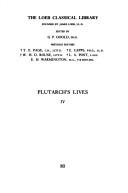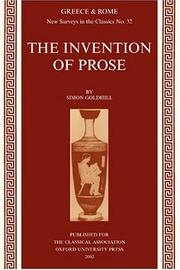| Listing 1 - 10 of 35 | << page >> |
Sort by
|

ISBN: 0674991095 Year: 1914 Publisher: New York : Harvard University Press,
Abstract | Keywords | Export | Availability | Bookmark
 Loading...
Loading...Choose an application
- Reference Manager
- EndNote
- RefWorks (Direct export to RefWorks)
Plutarch wrote on many subjects. Most popular have always been the 46 Parallel Lives, biographies planned to be ethical examples in pairs (in each pair, one Greek figure and one similar Roman), though the last four lives are single. All are invaluable sources of our knowledge of the lives and characters of Greek and Roman statesmen, soldiers and orators. Plutarch{u2019}s many other varied extant works, about 60 in number, are known as Moralia or Moral Essays. They are of high literary value, besides being of great use to people interested in philosophy, ethics, and religion. --Publisher's Website (accessed June 2019).

ISBN: 0674991109 Year: 2014 Publisher: Cambridge, MA : Harvard University Press,
Abstract | Keywords | Export | Availability | Bookmark
 Loading...
Loading...Choose an application
- Reference Manager
- EndNote
- RefWorks (Direct export to RefWorks)

ISBN: 0674991117 Year: 1919 Publisher: Cambridge, MA : Harvard University Press,
Abstract | Keywords | Export | Availability | Bookmark
 Loading...
Loading...Choose an application
- Reference Manager
- EndNote
- RefWorks (Direct export to RefWorks)
Annotation Plutarch (Plutarchus), ca. 45Â-120 CE, was born at Chaeronea in Boeotia in central Greece, studied philosophy at Athens, and, after coming to Rome as a teacher in philosophy, was given consular rank by the emperor Trajan and a procuratorship in Greece by Hadrian. He was married and the father of one daughter and four sons. He appears as a man of kindly character and independent thought, studious and learned. Plutarch wrote on many subjects. Most popular have always been the 46 Parallel Lives, biographies planned to be ethical examples in pairs (in each pair, one Greek figure and one similar Roman), though the last four lives are single. All are invaluable sources of our knowledge of the lives and characters of Greek and Roman statesmen, soldiers and orators. Plutarch's many other varied extant works, about 60 in number, are known as Moralia or Moral Essays. They are of high literary value, besides being of great use to people interested in philosophy, ethics and religion. The Loeb Classical Library edition of the Lives is in eleven volumes.

ISBN: 0674991133 Year: 1921 Publisher: Cambridge : Harvard University Press,
Abstract | Keywords | Export | Availability | Bookmark
 Loading...
Loading...Choose an application
- Reference Manager
- EndNote
- RefWorks (Direct export to RefWorks)
Annotation Plutarch (Plutarchus), ca. 45-120 CE, was born at Chaeronea in Boeotia in central Greece, studied philosophy at Athens, and, after coming to Rome as a teacher in philosophy, was given consular rank by the emperor Trajan and a procuratorship in Greece by Hadrian. He was married and the father of one daughter and four sons. He appears as a man of kindly character and independent thought, studious and learned. Plutarch wrote on many subjects. Most popular have always been the 46 Parallel Lives, biographies planned to be ethical examples in pairs (in each pair, one Greek figure and one similar Roman), though the last four lives are single. All are invaluable sources of our knowledge of the lives and characters of Greek and Roman statesmen, soldiers and orators. Plutarch's many other varied extant works, about 60 in number, are known as Moralia or Moral Essays. They are of high literary value, besides being of great use to people interested in philosophy, ethics and religion. The Loeb Classical Library edition of the Lives is in eleven volumes.

ISBN: 0674991141 Year: 1926 Publisher: Cambridge, MA : Harvard University Press,
Abstract | Keywords | Export | Availability | Bookmark
 Loading...
Loading...Choose an application
- Reference Manager
- EndNote
- RefWorks (Direct export to RefWorks)
Annotation Plutarch (Plutarchus), ca. 45-120 CE, was born at Chaeronea in Boeotia in central Greece, studied philosophy at Athens, and, after coming to Rome as a teacher in philosophy, was given consular rank by the emperor Trajan and a procuratorship in Greece by Hadrian. He was married and the father of one daughter and four sons. He appears as a man of kindly character and independent thought, studious and learned. Plutarch wrote on many subjects. Most popular have always been the 46 Parallel Lives, biographies planned to be ethical examples in pairs (in each pair, one Greek figure and one similar Roman), though the last four lives are single. All are invaluable sources of our knowledge of the lives and characters of Greek and Roman statesmen, soldiers and orators. Plutarch's many other varied extant works, about 60 in number, are known as Moralia or Moral Essays. They are of high literary value, besides being of great use to people interested in philosophy, ethics and religion. The Loeb Classical Library edition of the Lives is in eleven volumes.
Book
ISBN: 9789004605169 Year: 1754 Publisher: Leiden ; Boston : Brill,
Abstract | Keywords | Export | Availability | Bookmark
 Loading...
Loading...Choose an application
- Reference Manager
- EndNote
- RefWorks (Direct export to RefWorks)

ISBN: 0198525230 9780198525233 Year: 2002 Volume: 32 Publisher: Oxford: Oxford university press,
Abstract | Keywords | Export | Availability | Bookmark
 Loading...
Loading...Choose an application
- Reference Manager
- EndNote
- RefWorks (Direct export to RefWorks)
Book
ISBN: 9780521661294 1322882053 0521661293 9781316128640 9781139023702 1316128644 1139023705 9781316129739 131612973X 1316121011 1316133001 1316119904 1316130827 1316127559 9781316121016 9781316133002 9781316119907 9781316130827 9781316127551 Year: 2014 Publisher: Cambridge [etc.] Cambridge University Press
Abstract | Keywords | Export | Availability | Bookmark
 Loading...
Loading...Choose an application
- Reference Manager
- EndNote
- RefWorks (Direct export to RefWorks)
This volume assembles fourteen highly influential articles written by Michael H. Jameson over a period of nearly fifty years, edited and updated by the author himself. They represent both the scope and the signature style of Jameson's engagement with the subject of ancient Greek religion. The collection complements the original publications in two ways: firstly, it makes the articles more accessible; and secondly, the volume offers readers a unique opportunity to observe that over almost five decades of scholarship Jameson developed a distinctive method, a signature style, a particular perspective, a way of looking that could perhaps be fittingly called a 'Jamesonian approach' to the study of Greek religion. This approach, recognizable in each article individually, becomes unmistakable through the concentration of papers collected here. The particulars of the Jamesonian approach are insightfully discussed in the five introductory essays written for this volume by leading world authorities on polis religion.
Greek prose literature --- History and criticism --- Greece --- Religion --- Greece -- Religion. --- Greek prose literature -- History and criticism. --- Greek prose literature. --- Religion. --- Languages & Literatures --- Greek & Latin Languages & Literatures --- E-books --- History and criticism. --- Greece -- Religion --- Greek prose literature -- History and criticism
Book
ISBN: 0674200411 9780674200418 Year: 1993 Publisher: Cambridge (Mass.): Harvard university press,
Abstract | Keywords | Export | Availability | Bookmark
 Loading...
Loading...Choose an application
- Reference Manager
- EndNote
- RefWorks (Direct export to RefWorks)
Book

ISBN: 0674996364 9780674996366 Year: 2009 Volume: 508 Publisher: Cambridge: Harvard university press,
Abstract | Keywords | Export | Availability | Bookmark
 Loading...
Loading...Choose an application
- Reference Manager
- EndNote
- RefWorks (Direct export to RefWorks)
Works by authors such as Philitas of Cos, Alexander of Aetolia, Hermesianax of Colophon, Euphorion of Chalcis and, especially Parthenius of Nicaea, who composed the mythograpical Sufferings in Love, represent rich inventiveness in Hellenistic prose and poetry from the fourth to the first century BCE.
Greek poetry, Hellenistic --- Greek prose literature --- Greek prose literature, Hellenistic --- Languages & Literatures --- Greek & Latin Languages & Literatures --- Hellenistic Greek poetry --- Hellenistic Greek prose literature --- Greek literature, Hellenistic --- Greek literature --- Geschichte 336 v. Chr.-31 v. Chr. --- Greek prose literature, Hellenistic - Translations into English --- Greek poetry, Hellenistic - Translations into English --- Greek prose literature - Translations into English --- Poésie grecque hellénistique --- Prose grecque --- Translations into English --- Traductions anglaises --- Greek poetry, Hellenistic. --- Greek prose literature, Hellenistic.
| Listing 1 - 10 of 35 | << page >> |
Sort by
|

 Search
Search Feedback
Feedback About UniCat
About UniCat  Help
Help News
News